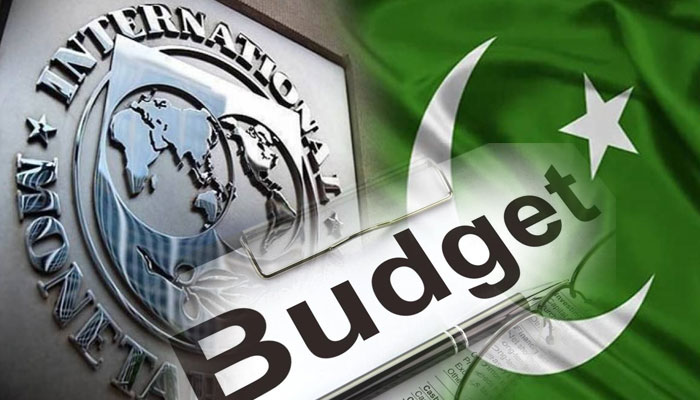IMF seeks fiscal adjustments in coming budget
ISLAMABAD: The revival of stalled IMF program for Pakistan hinges upon the government’s ability to make fiscal adjustments of almost 2.5 percent of Gross Domestic Product, equivalent to Rs2,000 billion, through raising revenues and curtailing expenditures in the upcoming budget.
The IMF’s wish-list or demands do not end here as the government will have to end petrol subsidy of Rs39 per liter, diesel subsidy of Rs53 per liter, jack up electricity tariff by Rs8 per unit through an increase in base tariff and fuel price adjustments and hiking gas tariff by 20 percent on average for demonstrating its seriousness for undertaking the much-needed 'reforms agenda' under the advice of the IMF program.
Minister for Finance Miftah Ismail told this scribe on Tuesday night that the staff-level agreement with the IMF was expected to be done by mid-June 2022. It indicates that the staff-level agreement was expected to be struck only after the announcement of the next budget 2022-23 in line with the IMF program objectives.
However, the sources said that the IMF has asked for steep and rapid adjustments on the fiscal front in order to bring the economy back on the stabilization path. The announcement of the next budget 2022-23 aligned with IMF policies will set the stage for a stabilization path but here is the catch-22 situation as the government will have to choose its path of undertaking tough decisions, instead of moving towards doling out resources for gaining political support.
In such a scenario, the IMF is asking for jacking up FBR’s tax collection target up to Rs7.5 trillion for the next budget and reducing development funds as well as the subsidies. The fiscal deficit is all set to escalate close to Rs5,000 billion or 7.4 percent of GDP and now the IMF is asking to bring it down to 4.9 percent of GDP for the next fiscal year. The FBR will have to collect additional taxes of Rs1,200 to Rs1,500 billion in the next fiscal year for making the fiscal framework sustainable and prudent in line with the IMF prescriptions.
On the expenditure side, it is yet to be seen how the government will find out resources to increase salaries and pensions in the range of 10 to 15 percent for mitigating the difficulties of inflation-stricken fixed income groups living in urban areas.
Although, the government preferred to keep the POL prices unchanged at the existing level from June 1, 2022 yet it would have to pass on the burden to consumers after the announcement of the coming budget. The latest estimates suggest that despite raising the POL prices by Rs30 per liter, the subsidy on petrol stood at Rs39 per liter, which was earlier standing at Rs17 per liter after raising the prices on May 27, 2022. It's ironic that the sale of petroleum products went up by 28 percent in May 2022 in comparison with the same month of the last fiscal year. The POL products sales increased by 18 percent in the first 11 months of the current fiscal year compared to the same period of the last financial year.
-
 King Charles Secretly Relies On Advice From THIS Royal
King Charles Secretly Relies On Advice From THIS Royal -
 Jennifer Garner Reveals Beauty Choice She Makes As Botox Alternative In Her 50s
Jennifer Garner Reveals Beauty Choice She Makes As Botox Alternative In Her 50s -
 Kate Middleton Drops Four-word Message For Young Girl After Wales Visit
Kate Middleton Drops Four-word Message For Young Girl After Wales Visit -
 Shamed Andrew Uncensored ‘massages’ Should Be Refunded To Public
Shamed Andrew Uncensored ‘massages’ Should Be Refunded To Public -
 Kylie Kelce Reveals Rules She Wants Daughter Bennett To Learn At 3: No More 'passies'
Kylie Kelce Reveals Rules She Wants Daughter Bennett To Learn At 3: No More 'passies' -
 Smartphone Market Set For Biggest-ever Decline In 2026
Smartphone Market Set For Biggest-ever Decline In 2026 -
 Mud, Rain, Loincloths: All About Japan’s 200-year-old Harvest Wrestling Ritual
Mud, Rain, Loincloths: All About Japan’s 200-year-old Harvest Wrestling Ritual -
 Jonathan Majors Set To Make Explosive Comeback To Acting After 2023 Conviction
Jonathan Majors Set To Make Explosive Comeback To Acting After 2023 Conviction -
 Next James Bond: Why Jacob Elordi May Never Get 007 Role?
Next James Bond: Why Jacob Elordi May Never Get 007 Role? -
 Maddox Drops Pitt From Surname In Credits Of Angelina Jolie’s New Film 'Couture' Despite Truce From Father's End In Legal Battle
Maddox Drops Pitt From Surname In Credits Of Angelina Jolie’s New Film 'Couture' Despite Truce From Father's End In Legal Battle -
 Meghan Markle Adds Diamonds To Engagement Ring For Jordan Trip
Meghan Markle Adds Diamonds To Engagement Ring For Jordan Trip -
 Burger King Launches AI Chatbot To Track Employee Politeness
Burger King Launches AI Chatbot To Track Employee Politeness -
 Andrew’s Woes Amid King Charles’ Cancer Battle Triggers Harry Into Action For ‘stiff Upper Lip’ Type Dad
Andrew’s Woes Amid King Charles’ Cancer Battle Triggers Harry Into Action For ‘stiff Upper Lip’ Type Dad -
 Experts Warn Andrew’s Legal Troubles In UK Could Be Far From Over
Experts Warn Andrew’s Legal Troubles In UK Could Be Far From Over -
 Teyana Taylor Reflects On Dreams Turning Into Reality Amid Major Score
Teyana Taylor Reflects On Dreams Turning Into Reality Amid Major Score -
 Jennifer Garner Drops Parenting Truth Bomb On Teens With Kylie Kelce: 'They're Amazing'
Jennifer Garner Drops Parenting Truth Bomb On Teens With Kylie Kelce: 'They're Amazing'




